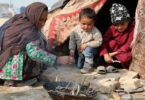KABUL (Tolo News): Herat’s department of information and culture said that the construction of unplanned and substandard roads in Herat is threatening a number of historic religious sites, including Hindu temples and Jewish synagogues in the city.
According to the Herat department of protection of historic monuments, the height of the streets and roads in the area where the temples and other monuments are located is two meters higher than the monuments and this could cause water to flood the sights and cause damage.
“Unplanned construction works have been done in the areas where the historic monuments are located—the projects were launched together between UN-HABITAT and Herat municipality—even some of the old houses which had great historic prestige have been affected,” said Zalmay Safa, the head of Herat department of protection of historic monuments.
“It is the responsibility of the department of information and culture and the local administration in Herat to focus on the Jewish synagogue, this will also lead to disappointment among other countries to help us, because it creates mistrusts among them to help Afghanistan,” said Abdul Ghani Khesrawi, a university lecturer in Herat.
Meanwhile, a number of residents in the area who lived together with the Jews, Hindus and other minority groups, shared memories of the past. Juma Khan, 75, is a resident of Herat who has good memories of his Jewish neighbor in Herat, and says there was a time when Muslims and Jews were worshiping together inside the facility.
There are three Jewish synagogues in Herat. One was totally destroyed, one was converted to a mosque, and one to a school. There is also one Jewish cemetery in the city. “When the Jews lived in Herat, there was no discrimination between us and them, no one was creating any ethnic issues, there was no difference between us and them and we had no problems with each other, they were good people, we had no problem with each others’ faith,” said Juma Khan, a resident in Herat.
“My house is located just near the Jewish temple. They were our neighbors, we were in touch with them 24 hours a day and we had no problem with each other, we spent a very peaceful life,” said Mohammad Younus, a resident in Herat. Most of the Jewish residents migrated from Herat to Israel between 1930 and 1940. Some of them left Afghanistan over the past 40 years.
“During the life of the Prophet of Islam, many Jews and followers of other faiths lived near him. Faith and religious belief is not a crime, we had Jews and Christians in Herat—unfortunately some of them migrated from Afghanistan due to some illogical trends and war,” said Abdul Khaliq Haqqani, the head of Herat’s Hajj and Pilgrimage department.






